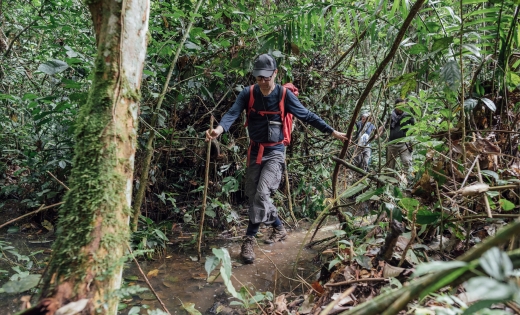Celebrate Our Staff – May 2023
Join us as we celebrate our colleagues’ achievements across the University from the past few weeks.

Featured this month:
- New book unearths the York of times gone by
- French honour for professor
- Medal for Spanish culture expert
- National role for palliative care specialist
- Professor marks major marking milestone
- Royal Society Fellowship for Geograohy professor
New book unearths the York of times gone by
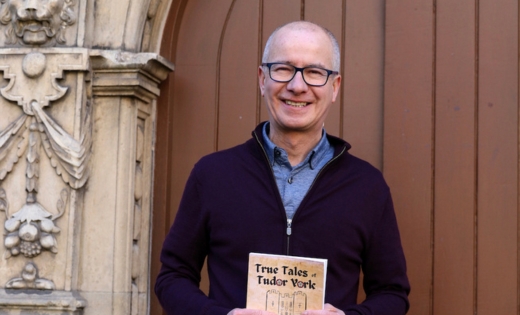
Tony Morgan has written a new book on Tudor York.
Tony, from the Leeds University Business School, explores the history of the city during the period, as well as the lives of the people who lived there.
‘True Tales of Tudor York’ is Tony’s second non-fiction book and follows on from his previous fiction and non-fiction writing. In recent years, he has written three historical novels which focused on the 1605 Gunpowder Plot and Guy Fawkes’ earlier youth in York.
It was while writing his book on Fawkes that Tony came across the tragic history of York martyr Margaret Clitherow. He decided to tell her story in both fiction and non-fiction books, a move which inspired him to continue his historical research and write ‘True Tales of Tudor York’.
This book covers a wide range of stories from the city during the reign of the Tudors, including royal visits, plague, the treatment of the poor, taxes, religious and political unrest, floods and even an earthquake.
Tony said: “The most fascinating things for me are always the stories about ordinary people. From the boys punished for playing football in York Minster to Widow Atkinson who was found a home after being discovered penniless in the street with her "diverse small children".
“History becomes much more real to me when we see it through the eyes of people beyond kings and queens.”
The book is currently for sale online and at the Little Apple Bookshop in York. All proceeds from Tony’s books and history talks go to St. Leonard’s Hospice in York and thousands of pounds have been raised so far.
More details about Tony’s books and talks can be found on his website.
French honour for professor
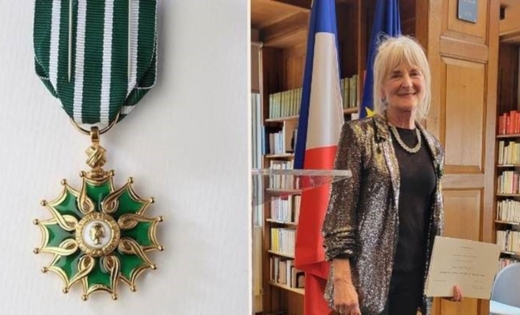
Professor Diana Holmes has been honoured by the French government for her contribution to research in French arts and culture.
Professor Holmes, from the School of Languages, Cultures and Societies, has received the honour of Officier dans l’Ordre des Arts et Lettres (Officer of the Order of Arts and Letters).
The accolade places her among a star-studded company of Officiers that includes Sir Elton John, Van Morrison and French actresses Jeanne Moreau and Marion Cotillard.
Awarded by the French ambassador to the UK, Madame Hélène Duchêne, the honour has three grades: Chevalier, Officier and Commandant. Professor Holmes was presented with the award for her significant contribution to French arts, literature and cultural inheritance, including her innovative research about French women writers, popular fiction, feminism and cinema.
Madame Duchêne also recognised Professor Holmes’ international promotion of French culture. As President of the Society for French Studies in the UK and Ireland, Professor Holmes plays a leading role in encouraging and supporting intellectual enquiry in French studies.
Professor Holmes said: “I am delighted and deeply honoured to receive this decoration, and it was especially good to do so in the presence of family, friends and colleagues.”
She was joined by colleagues Professor Emma Cayley and Professor Margaret Atack for the ceremony at the French Institute in Kensington.
France has awarded l'Ordre des Arts et des Lettres since 1957, to recognise eminent artists and writers, and people who have contributed significantly to furthering the arts in France and throughout the world.
Medal for Spanish culture expert
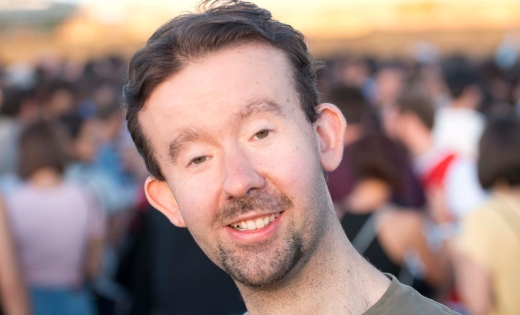
Professor Duncan Wheeler has been awarded the 2023 Tecmerin Medal for Services to Spanish Cinema by the Spanish-speaking world’s leading centre for audio-visual communication.
Professor Wheeler, from the School of Languages, Cultures and Societies, was awarded the prize by the Institute for Cinema at the Carlos III University in Madrid.
He was presented with the medal at the inaugural international seminar Intersectional Approaches to Spanish Audiovisual, which was hosted by the Carlos III University in April.
Professor Wheeler said: “It was a wonderful surprise and honour to be awarded the 2023 Tecmerin Medal for Services to Spanish Cinema by the Institute of Cinema. Looking down the list of previous recipients was somewhat intimidating but, as always, I was made to feel at home in the ceremony by my friends and colleagues from the Carlos III.”
Through his research, Professor Wheeler explores interrelationships between cultural institutions, art, politics and memory in contemporary and Early-Modern Spain.
His latest book, ‘Following Franco: Spanish culture and politics in transition’ looks at the role culture played in the political and social upheaval which took place following the death of dictator Francisco Franco and Spain’s transition to democracy.
Drawing on over 300 interviews with politicians, artists and journalists, as well as ordinary people, the book delves into the complex relationship Spain has with ‘the Transition.’
Professor Wheeler is also a regular contributor to the media and has his work has appeared in outlets including the Guardian, the Economist and the London Review of Books.
National role for palliative care specialist
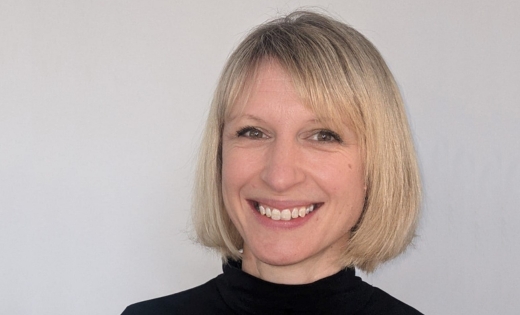
Dr Sarah Mitchell has been appointed Interim National Clinical Director for Palliative and End-of-Life Care for NHS England.
Dr Mitchell, from the Leeds Institute of Health Sciences, has held leadership roles in palliative care with local, regional, and national NHS commissioning and policy organisations for over ten years.
She also works as a GP in Sheffield.
In the National Clinical Director role, she will provide strategic leadership to drive transformation of services, and clinical advice to support the development of policy and parliamentary accountability. She will Co-Chair the National Ambitions Partnership for Palliative and End-of-Life Care.
Dr Mitchell said: “At the heart of my work is commitment to improving experiences for every patient with palliative care needs and those important to them. This appointment to the role of Interim National Clinical Director for Palliative and End of Life Care is an invaluable opportunity to influence and lead evidence-based policy development and to drive transformation of palliative care services.”
Dr Mitchell is committed to policy relevant research to improve palliative and end-of-life care for people of all ages, with all conditions, through integration and learning from patient experience.
In her new role, she aims to ensure that robust evidence informs future policy and commissioning. Her interests include improving palliative care in community and primary care settings, and effective integration of services to address inequalities.
Professor marks major marking milestone
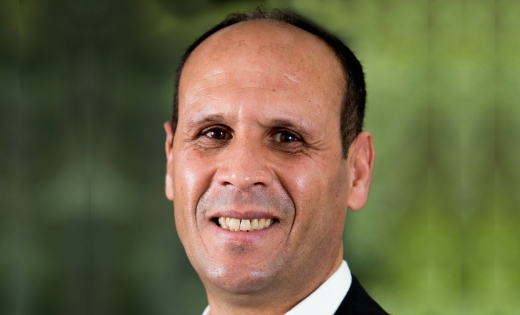
Professor El Mustapha Lahlali has reached the milestone of having examined 100 PhD theses.
Professor Lahlali, from the School of Languages, Cultures and Societies, is a leading expert in Arabic Studies, Applied Linguistics, Translation and Media and has examined theses across the UK and around the world.
The process has also been a learning experience for Professor Lahlali – including understanding the pragmatism required when examining PhDs in a non-standardised system, and how to approach all theses with an open mind and weigh them up based on their arguments.
Professor Lahlali said: “A good thesis is one that offers cutting-edge research and scholarship, where ideas are challenged and new approaches, paradigms and frameworks are developed.
“It is also one that challenges the current status quo, offering new solutions to persisting issues, which could have a greater impact on society.”
It is also important, he argues, to treat PhD candidates as experts in their field and recognise the effort they have put into their work over their three to four years of study.
Professor Lahlali added: “It is very rewarding to witness and celebrate with postgraduates a positive outcome for the culmination of many arduous and challenging years. It is also very encouraging to witness the transition from a PhD candidate to a doctor, deservedly earning a title and ready to start the next stage of their research career.”
Royal Society Fellowship for Geography professor
Professor Simon Lewis has been elected as a Fellow of the Royal Society, one of the highest accolades in science.
Professor Lewis, from the School of Geography, researches how human activity impacts on the “earth system”, particularly tropical ecosystems. It has helped identify the interplay between forests, deforestation and climate change.
Currently, he is leading a five-year interdisciplinary study into the impact of climate change on the Congo peatlands, one of the largest stores of sequestered carbon in the world.
Called CongoPeat, the research project sees Professor Lewis and his team working out how much carbon could be releases into the atmosphere from the peat as a result of climate change.
Research published earlier in 2023 revealed how previous climate change events resulted in the peatlands releasing carbon. The project is funded by the Natural Environment Research Council and findings from the research are being used to inform climate change policies.
Speaking about the award, Professor Lewis said: “I am really, really pleased, and to be honest a bit surprised. This honour is very cool, and is really a moment of recognition of two decades of teamwork. My election as a Fellow of the Royal Society rests on the hard work of many PhD students, post-doctoral researchers and scientists from all over the world.
“I have done a lot of fieldwork in tropical forests and remote tropical swamps, often to places where few scientists go, relying on the generosity of local people in hosting our field teams. I hope this honour helps me direct attention to the need to better protect tropical forests and improve the livelihoods of those who depend on them.”
Fellowship of the Royal Society – which is the UK’s national academy of sciences and the oldest science academy in continuous existence – recognises individuals who have made a “substantial contribution to the advancement of science.”
Professor Lewis also holds the chair in Global Change Science at University College London.
Read more about Professor Lewis’ Fellowship.
Get in touch!
We know there are lots of great things happening to support the work of the University – and we want to hear about them!
Please follow the staff Twitter account to see the latest updates and copy in our @UniLeedsStaff handle when posting success stories, so we can share them with colleagues.
You can also contact Internal Communications and Engagement directly at internalcomms@leeds.ac.uk if you or one of your colleagues would like to appear in this monthly feature. This is open to all staff – professional and academic.
Posted in: University news